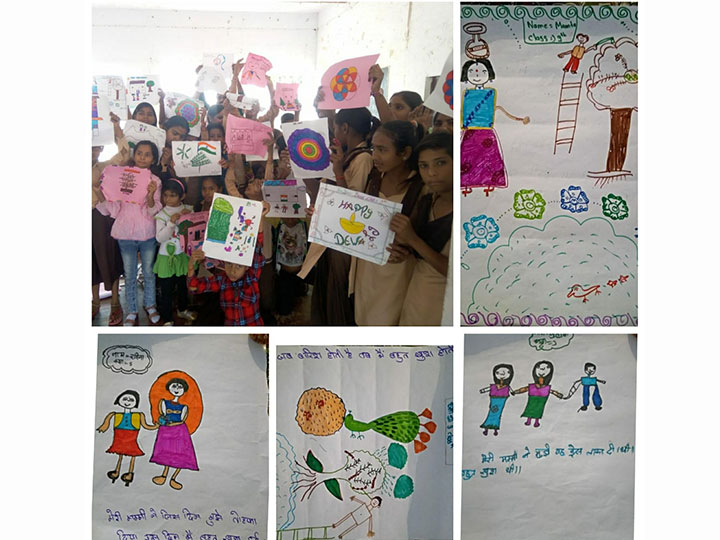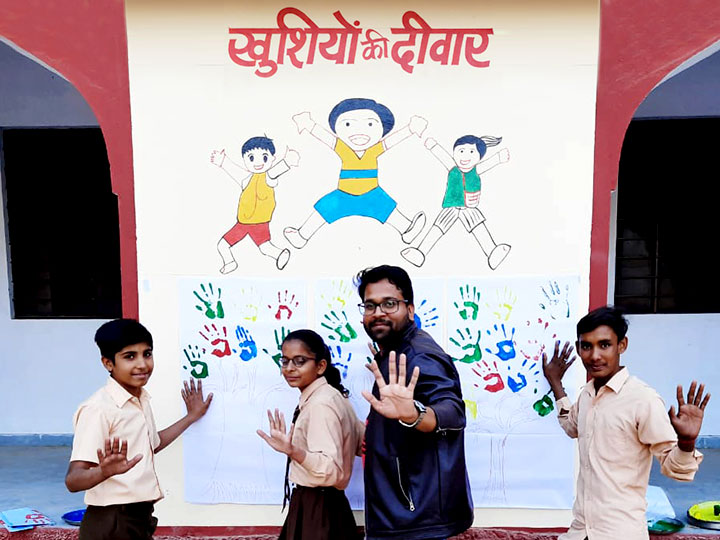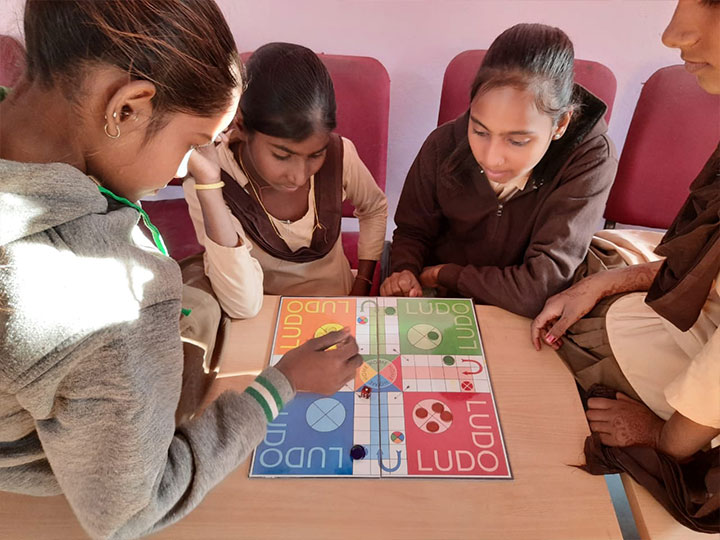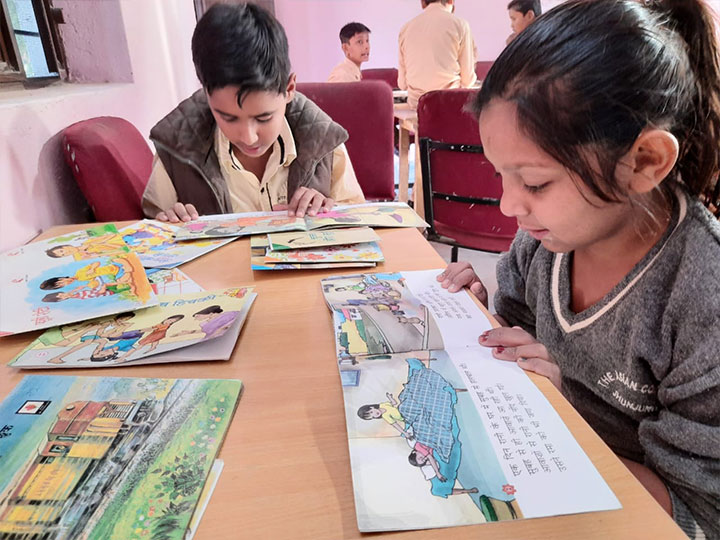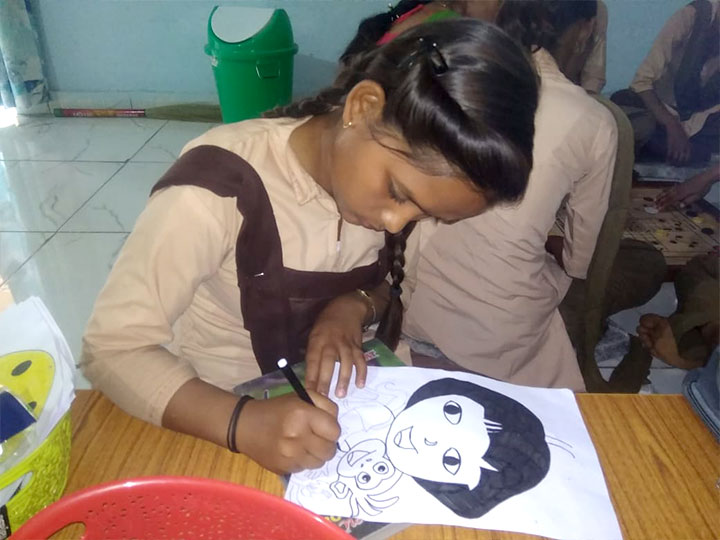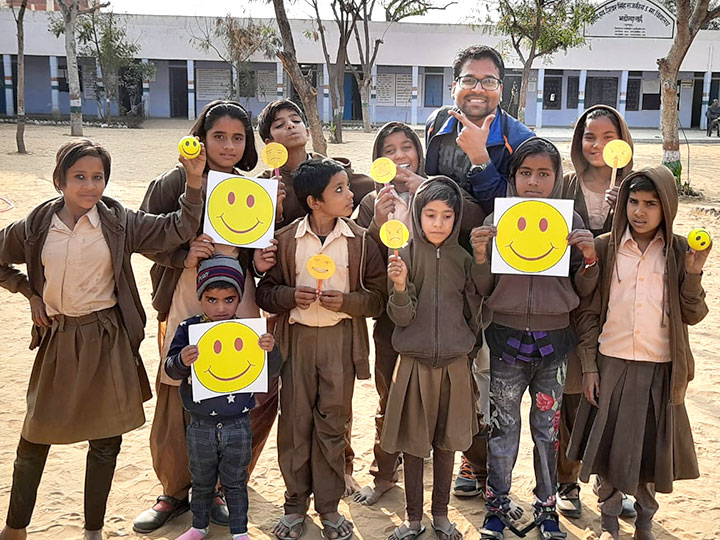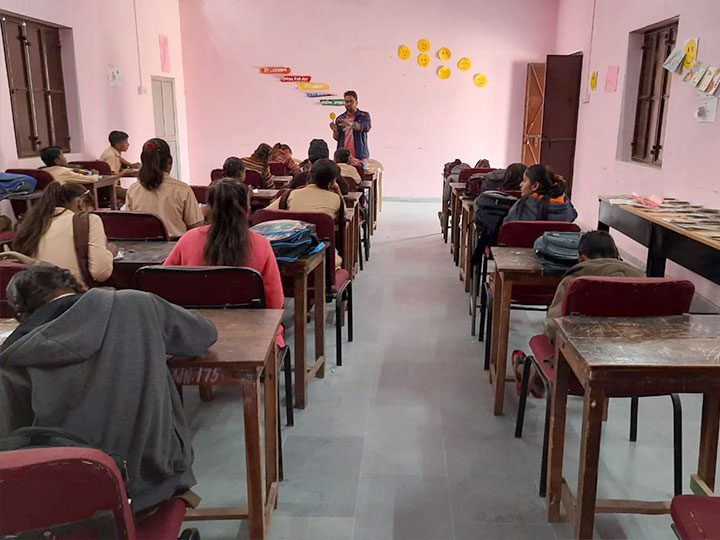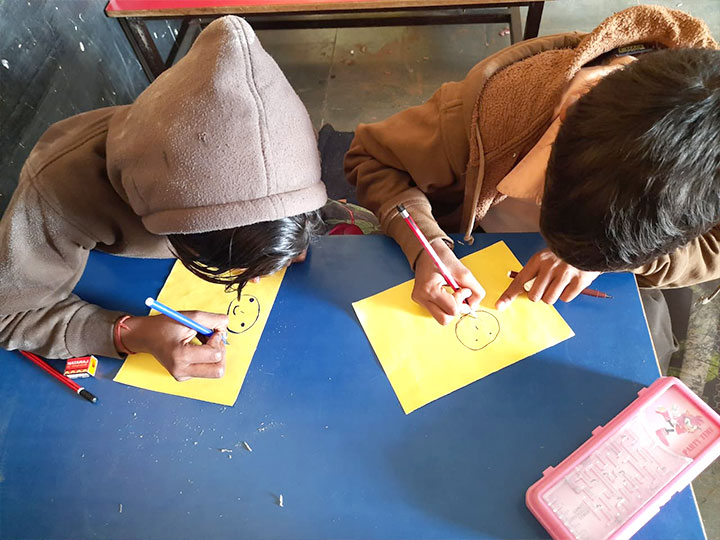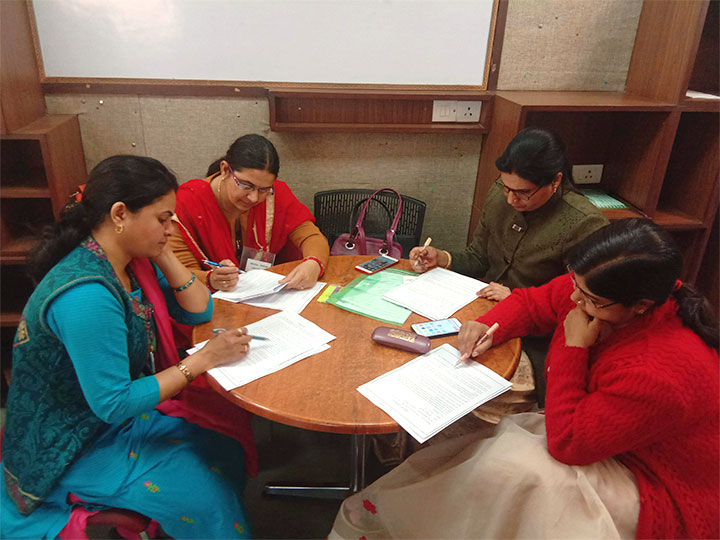Within the “Innovation Hub” we introduced multiple interventions, namely School Leadership Development, District Transformation, Virtual Field Support, and State Transformation, each intervention aimed at a specific quality aspect of education, but also designed such that all innovations worked together, to create larger impact.
Initially, behaviour change was based on our concept of “Headmaster as the Manager of the School”, and geared towards enabling school leaders to improve school processes, pedagogy of teachers, and participation of School Management Committees. This led to a large number of innovations such as assembly, library, school buildings, teaching – learning materials, teacher need analysis tools, teaching practices tools, coaching need analysis tool, etc. As we identified the challenges on the ground, we realised the district was the “unit of change” to scale these innovations from 100-125 schools to 1000 schools across the district, and District Transformation was born.
At District level, we interacted with cluster, block and district level officials, understood their needs and created products to improve leadership skills so that these “coaches” and “facilitators” are enabled to support School leaders, similar to how our school leadership program does. We also engaged the community to rally around school processes, and enrolment saw a 10x increase. By improving leadership, bringing community into school planning, and ensuring governance of these processes, we built in Jhunjhunu a clear delivery mechanism for the innovations produced on the ground. Despite this, we observed people required additional support. Our VirtualField Supportcentre bridges this gap by providing empathetic and timely support on-call. The women in these centres, work remotely, armed with knowledge on their computers for quick turnaround.
Apart from this, tosustain this development required removal of obstacles such as the time spent in documentation and legal issues, and lack of merit-based leadership. We then introduced State Transformation, an enabler to school and district interventions. In 2017-18, through process re-engineering, we were able to improve generation of mid-day meal report which took away one period per week of the teacher, and data gathering by middle managers that caused huge delays in decision making.
Through Centre of Excellence, each level of innovation is designed to add insight to a level above, and each one sustains a level below. The implementation model entails 20-25 youth, named Gandhi Fellows, working in remote locations within the district. Each location housed an independent office and residence for the workers on the ground – Fellows and their Program Leaders.
‘Innovation Hub’, initiated 3 years ago, has resulted in an increase of 20% in student learning outcomes. 2018-19 assessments reveal that improvement in outcomes in our intervention schools had a 5-10% gain over that of control schools in the same district. The success of our intervention model received a positive response from schools and government stakeholders and we were invited to scale our interventions across Rajasthan and 14 other states.
Outcomes and Impact:
Time saved through Process re-engineering (with Genpact Social Impact Fellowship):
- Mid-day meal reporting: 4 page report every week switched to 1 page report, saving 30-40 minutes of teaching time per week (implemented in 974 schools/54% in Jhunjhunu)
- Data gathering on schools: Simplification of process saved Middle Managers 15% of their time in 2019
Capacity building and support:
- 165 Master Facilitators selected through 3 step process from total of 500+ applicants
- 2500 principals and 223 Key Resource People capacitated through Master Facilitators
- 5000 Headmasters and Principals trained
- 274 Block Education Officers oriented to new block level structure
- 800+ teacher workshops, 400+ Headmaster trainings based on adult learning principles
- 32,500+ calls to teachers and headmasters
Enrollment and Community participation:
- 6000 girls/15,000+ re-enrollments through enrollment campaign “ApnaBachaApnaVidyalay”
- 178,000 children from 3000+ schools and AnganwadiCentres participated in BalSabha Programs
- 1750 children read books for 14,000 hours a month through ‘Akkad Bakkad’ campaign that set up libraries and enriched classroom walls
Student learning outcomes:
- In National Achievement Survey 2017, Jhunjhunu achieved 1st in the State and 2nd in the National level in Class 3 (avg. 82) and Class 5 (avg. 77)
- School Leadership Development measures Student Learning Outcomes as a direct result of teacher development. In 2018-19, assessments conducted along with Education Initiatives in Jhunjhunu displayed a gain of 17.9% with a final output of 48.9%.
Target Beneficiaries
Our direct beneficiaries are our stakeholders – education officials, teachers, headmasters and principals. Children are indirect beneficiaries, who are impacted by the work we do to support our stakeholders. Additionally, communities and youth are both stakeholders and beneficiaries of our program.
Stakeholders in schools are engaged through School Leadership Development:
- Teachers- 4378 + 7722 (Elementary + Secondary)
- Headmasters – 997
- Principals – 486
Education Officials at District/State are engaged in coaching and facilitation and process transformation:
- Cluster Resource Coordinators (/Panchayat Elementary Education Officers) – 301
- Block Resource Coordinators -24
- Block Education Officers- 24
- District Education Officers- 20
- Project Coordinators- 6
Youth and Community:
- Youth volunteers -5000+ B.Ed interns (community members who volunteer and teach children in schools to support teacher gap)
- Gandhi Fellows – 25 (who work at grassroots supporting activities in Schools and at District)
- Virtual Field Support women associates – 58 (who provide support to education officials through calls)
Stakeholder Engagement Strategy
- Capacity building workshops: 3-day workshops every quarter to introduce new concepts in leadership, pedagogy, coaching/facilitation, and to practice reflection and action
- Field Support: Fellows visit schools regularly and support Headmasters and Teachers in development of material that enriches classroom planning, teaching, and management
- Professional Learning Communities: Groups of stakeholders are made to work together in a community – share problems, resources, and enable each other transform professionally
- Virtual Field Support: Local women in call centres, trained in technology, empathetic listening, and pedagogic skills provide support to district officials and teachers through calls
Innovations:
- Libraries set up in schools to introduce joy of learning to children
- Student Parliaments initiated to bring ownership of school among students
- Assembly that enables children and community to come together and start the day strong
- Our concept of BaLA – Building as Learning Aid which transforms the infrastructure to create inclusive learning ecosystems
- ‘No Bag Day’ campaign to promote learning outside the classrooms
- BalSabha set up by students to bring school and community together and increase parent participation
- Activities based on Social, Emotional and Ethical Learning Concepts to improve soft skills of students, teachers, and officials
- Teacher/ Coaching/ Facilitator Need Analysis Tool to enable teachers to identify professional needs through self-reflection
- Teacher Instructional Practices with indicators that teachers can reflect on while viewing classroom videos

